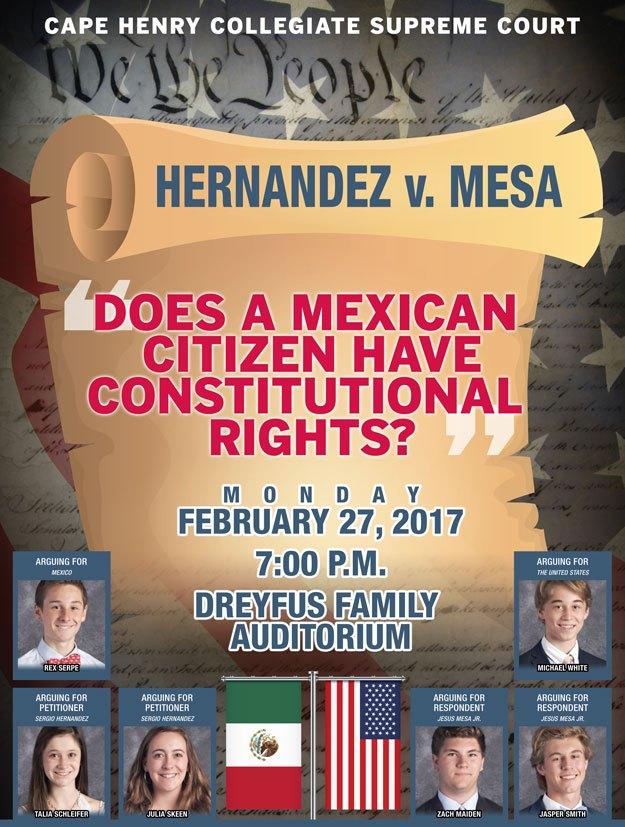Hernandez v Mesa Case Editorial
Written by Harry Zhang on February 23rd, 2017
Submitted for Publication on March 16, 2017
In the Supreme Court case of Hernandez v. Mesa, Sergio Hernández, a fifteen-year-old Mexican, was shot and killed by Jesus Mesa Jr., a U.S. border patrol agent. Hernandez was on Mexican soil and Mesa was on the United States’ side of the Paso del Norte border. The petitioners, the parents of Hernandez, have sued the defendant, Mesa, for money (which means it is a civil case), claiming that the actions taken by agent Mesa violated the Fourth Amendment to the constitution. The respondent, Jesus Mesa Jr., should prevail in this case. The Fourth Amendment, should not be considered in a case where a Mexican citizen was shot by a United States federal agent and died in the territory of Mexico.
The Supreme Court precedent United States v. Verdugo-Urquidez answered the claims of petitioners for the protection of the Fourth Amendment clearly. In that case, Verdugo Urquidez was a Mexican national residing in Mexico and was a suspected drug kingpin. The suspect, at the request of the Drug Enforcement Agency’s (DEA), was arrested, and then his residences were searched. The DEA found incriminating evidence with the cooperation of the Mexican government but without search warrants. The Supreme Court affirmed the decision made by the Court of Appeals for the Ninth Circuit that the Fourth Amendment did not apply to a foreign national arrested outside U.S. territory since he was not a U.S. citizen, and did not have any voluntary connections with the United States. Since Hernandez was not a U.S. citizen (nor did he have any voluntary connections with the United States), the case Hernandez v. Mesa is similar to the case United States v. Verdugo-Urquidez, and should be directly governed by the Supreme Court’s 1990 decision, which held that the Fourth Amendment does not apply to the search and seizure of a Mexican citizen’s property in Mexico.
Another precedent pertaining to the case is Boumediene v. Bush. In that case, aliens classified as enemy combatants were captured in Bosnia and held in custody after being transferred to Guantanamo Bay. One of the enemy combatants, Boumediene, filed for a writ of habeas corpus, claiming a violation of 5th amendment due process. A writ states that a person cannot be kept in prison unless he or she is first brought before a court of law to determine whether it is legal for him or her to be kept in prison. The court eventually ruled that the enemy combatants did have the right to habeas corpus. However, the Supreme Court justices should not consider the case Boumediene v. Bush since the place where Hernandez was standing when he was shot is not de facto United States territory and the United States has no power, control, or authority over the Mexican land, whereas the United States leased property in Cuba and exercised complete control over the territory where the Boumediene incident happened. Also, in the case Johnson v. Eisentrager, the U.S. Supreme Court decided that U.S. courts had no jurisdiction over German war criminals held in a U.S.-administered prison in Germany. The opinions of the Justices in these cases suggest that cases regarding foreigners are controversial, and that the rule of Boumediene v. Bush may just be an exception.
Lastly, an internal investigation by the Justice Department concluded that Jesus Mesa Jr. had not committed a crime. Granting the Hernandez family the right to sue would create Fourth Amendment jurisprudence that would have significant consequences for the United States government when conducting activities beyond its boundaries. We can’t protect everyone, especially when the potential consequences can be destructive. This case could be significant because the Fourth Amendment governs all manner of searches and seizure by U.S. officials, ranging from actual search and seizures of people to electronic devices used for electronic surveillance. Imagine if the Fourth Amendment applied outside U.S. borders and protected aliens: “an array of military, economic, and intelligence issues could be impacted.” To take two examples: “extraterritorial foreign intelligence surveillance and drone strikes, both of which have proceeded to date under the executive branch’s assumption that noncitizens outside the United States have no relevant constitutional rights in those contexts, could be impacted.”
For these reasons, the respondent Jesus Mesa Jr. should prevail.
Citation: Kent, Andrew. “Thoughts on the Briefing to Date in Hernandez v. Mesa-The Cross-border Shooting Case.” Lawfare. N.p., 27 Dec. 2016. Web. 17 Mar. 2017. <https://www.lawfareblog.com/thoughts-briefing-date-hernandez-v-mesa%E2%80%94-cross-border-shooting-case>.
Bibliography:
Editorial Staff. “FindLaw’s United States Supreme Court Case and Opinions.” Findlaw. N.p., n.d. Web. 17 Mar. 2017. <http://caselaw.findlaw.com/us-supreme-court/494/259.html>.
Editorial Staff. “Boumediene v. Bush.” Casebriefs Boumediene v Bush Comments. N.p., n.d. Web. 17 Mar. 2017.<http://www.casebriefs.com/blog/law/constitutional-lawconstitutional-law- keyed-to-sullivan/the-bill-of-rights-and-the-post-civil-war-amendments-fundamental-rights-and-the-incorporation-dispute/boumediene-v-bush/>.


